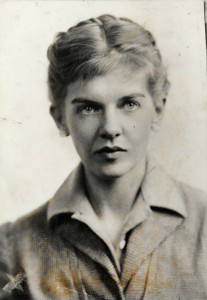 Born in Ottawa in Canada in 1913, poet and novel writer Elizabeth Smart grew up in a well-known and affluent family, her father a lawyer who regularly mixed with prominent figures of the day. Smart was given the best of starts in life with a good private education and it was no surprise when she became interested in writing, and poetry in particular, at a fairly early age.
Born in Ottawa in Canada in 1913, poet and novel writer Elizabeth Smart grew up in a well-known and affluent family, her father a lawyer who regularly mixed with prominent figures of the day. Smart was given the best of starts in life with a good private education and it was no surprise when she became interested in writing, and poetry in particular, at a fairly early age.
Smart also had a great love for music and chose to travel abroad to England to study it at King’s College when she was eighteen. On graduation she found a job traveling as a secretary to Margaret Watt who was head of a movement for women living in rural areas and it was during this moment in her life that she first came across a book of poetry by George Barker that would define much of her future.
Smart’s relationship with the English poet began then and Smart would often say to friends that she wanted to meet him and indeed marry him. After she finished working for Mrs Watt, Smart returned home to Ottawa and began working on the local journal there. She was, however, intent on starting her own writing career and, after just six months, handed in her notice and decided to travel on her own.
Smart visited New York and California and met other writers prominent at the time, including Lawrence Durrell. It was through him that she was able to finally make contact with the love of her life. Barker was unfortunately married and living in Japan but he made the effort to travel to the United States and when he met Smart they began a long standing and passionate affair.

The relationship led to her becoming pregnant and she returned to Canada hoping that Barker would follow. When he tried to do so her own family intervened and the writer was refused an entry visa which prompted Smart to move back to the United States again. By the time the Second World War was raging across Europe, Smart, pregnant for a second time, moved to England where she worked at the Ministry of Defence and could be closer to Barker.
It was during this period when she wrote her most famous work By Grand Central Station I Sat Down and Wept, a fictional account of her relationship with Barker. She had two more children with Barker and took up a post as a writer for advertising copy which she held until 1966 when she moved to Suffolk and once more devoted her time to creative writing.

In 1977, Smart published a small collection of poetry under the title A Bonus. She followed it up seven years later with more previously unpublished poetical works called In the Meantime. After a brief period as the resident writer at Alberta University, she headed back to England which she saw as her spiritual home.
In 1986 she suffered from a heart attack whilst at home in Suffolk and died shortly afterwards at the age of 72. Barker survived her by just a few years and himself died in 1991.

